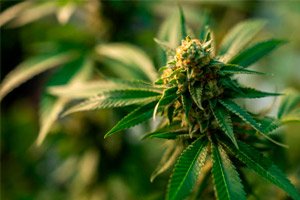
All iLive content is medically reviewed or fact checked to ensure as much factual accuracy as possible.
We have strict sourcing guidelines and only link to reputable media sites, academic research institutions and, whenever possible, medically peer reviewed studies. Note that the numbers in parentheses ([1], [2], etc.) are clickable links to these studies.
If you feel that any of our content is inaccurate, out-of-date, or otherwise questionable, please select it and press Ctrl + Enter.
Prenatal exposure to cannabis is associated with increased risk of opioid dependence in later life
Last reviewed: 02.07.2025
 ">
">With the increasing legalization of recreational cannabis, up to one in five pregnant women in the US now use the drug to relieve morning sickness, lower back pain or anxiety. However, there is growing evidence that tetrahydrocannabinol (THC), the main psychoactive component of cannabis, poses risks to the developing fetus by affecting brain development. A new study suggests it may increase the risk of opioid addiction in the future.
A preclinical animal study conducted by researchers at the University of Maryland School of Medicine was published in the journal Science Advances. The study found that prenatal exposure to THC causes a rewiring of the fetal brain. THC causes certain brain cells called dopamine neurons to become hyperactive, resulting in increased release of dopamine. This was accompanied by an increased response of the neurons to reward-related cues, such as light indicating the availability of food or an opioid drug.
"Clinicians are seeing a dramatic increase in cannabis use, with THC content four times greater than a generation ago. This highlights the long-term effects of cannabis on the developing reward system in the brain, ultimately leading to neurobiological vulnerability to opioids," said Dr. Joseph Tchir, PhD, professor of neuroscience and psychiatry at the University of Maryland School of Medicine and the study's author.
The American College of Obstetricians and Gynecologists recommends that physicians inform patients of the potential negative effects of continued cannabis use during pregnancy. Dr. Tchir and his colleagues are eager to learn more about the effects of THC on developing fetuses to help physicians better counsel their patients about the drug’s effects.
The illustration shows that male animals exposed to THC in the womb show a stronger release of dopamine, "the brain chemical that causes reward seeking," when exposed to opioid drugs during adolescence compared to those never exposed to THC.
To conduct the study, the team found that fetuses exposed to a moderately low dose of THC (equivalent to their mothers smoking one to two cigarettes per day) developed changes in the reward system that led to an opioid-seeking phenotype. Animals exposed prenatally to THC showed significantly greater motivation to press a lever that delivered an opioid dose compared to those not exposed.
When THC-exposed animals reached early adulthood, they were more likely to exhibit increased opioid seeking and more likely to relapse into addiction when exposed to opioid-associated environmental cues, compared to animals that were not exposed to THC in utero. They were also more likely to develop persistent addiction-like behaviors.
In a follow-up experiment, the researchers implanted tiny sensors in the animals' brains to measure the increased release of dopamine accompanied by the activity of neurons that were overreactive to opioid-related cues in rats with severe addiction-like behavior.
"These observations support the hypothesis of a hypersensitive 'craving' system that develops in the brain following prenatal THC exposure," said Dr. Tchir. "Interestingly, this opioid-seeking phenotype is significantly more common in males than females. We are currently conducting studies with colleagues at UMSOM to determine why this is the case."
Dr. Chir’s previous work, published in the journal Nature Neuroscience, found that prenatal exposure to THC makes dopamine neurons in the brain hyperactive, which may contribute to an increased risk of mental disorders such as schizophrenia. His findings have been independently confirmed by three labs around the world.
Along with colleague Dr. Mary Kay Lobo, professor of neuroscience at UMSOM, Dr. Tchir is co-director of the Center for the Study of Substance Use in Pregnancy, part of UMSOM’s Kahlert Institute for Addiction. They work with a team of researchers to study the long-term effects of drugs and alcohol on the fetus in the womb.
“We need to fully understand the long-term effects of THC exposure in utero and see if we can reverse some of the negative effects with CRISPR-based gene therapy or repurposed drugs,” said UMSOM Dean Mark T. Gladwin, MD, the John Z. and Akiko K. Bowers Distinguished Professor and vice president of medical affairs at the University of Maryland, Baltimore. “We also need to provide more accurate advice to pregnant patients, many of whom use cannabis to manage anxiety, believing it is safer for the baby than traditional anti-anxiety medications.”
The study was funded by the National Institute on Drug Abuse (Grant: R01 DA022340) (Grant: K99 DA060209). The first author of the paper was Dr. Miguel A. Lujan, a postdoctoral fellow in the Department of Neuroscience at UMSOM.
